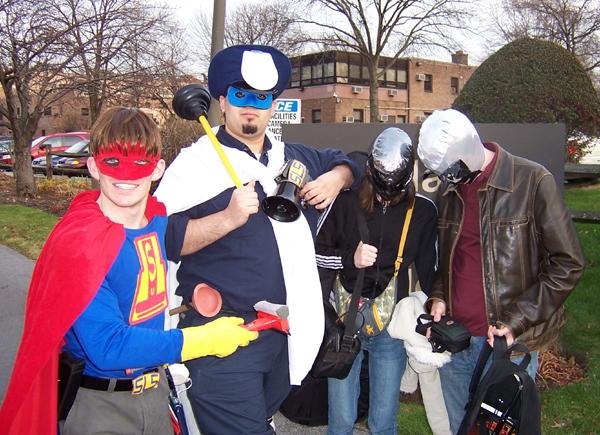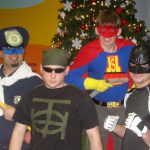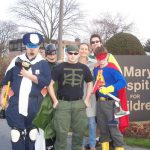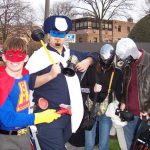
Ben Wilson
by
Dan Rafter
Be worried, people of Boise. Be very worried.
You are not protected.
Sure, the police are still there to handle your pickpockets, muggers, thieves and robbers. But what if a supervillain drops out of the sky, shooting lightning bolts from his fingertips? What if a nuclear bomb comes rushing through downtown? Who’s going to stop it now that the Boise Brigade is out of action?
Yes, the news is true: The Boise Brigade is on hiatus, at the very least. When will they return to patrol the city’s streets? No one knows. The Boise Brigade, that team of real-life superheroes who vowed to protect the city, is officially in training.
Wait. You don’t know what the Boise Brigade is? You’ve never heard of Nightfall or Exemplar or Freya? The Boise Brigade is a team of real-life superheroes.
The Brigade’s members can’t fly, turn invisible, lift battleships over their heads or spit fire. But they still consider themselves superheroes. And they’re far from alone. An entire community of adventurers, located everywhere from Wisconsin to Phoenix, from Los Angeles to New York City, call themselves real-life superheroes. With names like Dark Guardian, Citizen Prime, Ferox and Mr. Silent, they dress in costumes–using masks and capes and body armor, silver canes, bowler hats, whatever’s around–and patrol the streets of their cities, looking for crimes to stop and people to help.
It sounds like fiction, but it’s real. Just log on to the World Superhero Registry at
www.worldsuperheroregistry.com, to find a list.
Here’s how Nightfall describes himself on his MySpace page: “To the bad people, I’m that thing that hides in the shadows that we’re all afraid of, and to the good people I’m the protector that looks over them when they walk home alone at night.”
But, where are they? What are these real-life heroes doing to protect the citizens of Boise?
Who knows? The Brigade declined the opportunity to be interviewed for this story. In an e-mail message, Nightfall reported that the team may not yet be ready to tackle its lofty mission. He cited the group members’ ages–they are all fairly young–and the fact that they are still training to be superheroes. They are also questioning, Nightfall says, whether Boise even needs real-life superheroes.
Does this mean that Boise is on its own? It’s hard to tell; Nightfall did not respond to an e-mail message asking for more information. There is some hope, though, that the brigade is not on a permanent break: Nightfall promised an interview with
BW in the future, when the group is more certain of how it will operate or if it is even needed.
If the group is interested in learning the challenges and rewards of being a real-life superhero, they can always speak with more veteran members of the community.
Mr. Silent and Doktor DiscorD have been patrolling the streets of Indianapolis, sometimes together, sometimes alone, for more than a year. They’ve become local celebrities, with Mr. Silent and his silver mask, black bowler hat, white gloves and trademark cane, becoming an especially common sight in Indianapolis’ magazines and newspapers and on local TV stations.
“Most people my age, when boredom comes on, they decide to hang out with friends, go drinking, see a show or something like that,” Doktor DiscorD says. “I felt like doing something different. Not only could I alleviate my boredom in a novel way, I could also help people.”
Just because he’s a superhero doesn’t mean Doktor DiscorD is a saint. He admits this: Early in a phone interview, he needs to take a quick break to find and light a cigarette.
“Yeah, I’m no Superman,” he says.
That applies to busting up criminals, too. Like most of the real-life superheroes out there–the sane ones, at least–Doktor DiscorD would rather help than fight. To see the truth in this, check out the blogs written by most real-life supeheroes. Most are clustered on MySpace. Most patrols consist of little more than superheroes chatting with residents, helping people who are lost or even refilling the plastic baggies in those doggie-doo boxes in public parks.
But while 99 percent of patrols are quiet, there are exceptions. Mr. Silent, for example, earlier this year stopped a domestic violence situation from getting out of hand. He spotted a man and woman arguing outside a bar on a busy September night. The man angrily threw the woman against a brick wall. That was all Mr. Silent needed to see.
He leapt between the man and woman, brandishing his silver cane. The man screamed at him to leave. Mr. Silent didn’t budge. The man got angrier. Mr. Silent still didn’t flinch.
That’s when the cops showed up, and carted the angry man away.
On his blog, Mr. Silent wrote about shaking with adrenaline as he left the scene. He also wrote about how unimpressed the police were with his mask and outfit. They thanked him for his help and then went about their business.
“They acted as though they always see superheroes,” Mr. Silent wrote.
Supherhero, from Clearwater, Florida, agrees that a real-life superhero should concentrate on public service, not crime fighting. Superhero is far more interested in doing good deeds–while wearing his red-and-blue costume, complete with a yellow belt emblazoned with the initials “SH” on it–than he is in jumping in the middle of gang fights. This December, he donated 200 toys to a children’s hospital.
“This is an exciting life,” Superhero says. “You can’t tell me it’s not. And I’m lucky that my girlfriend thinks it’s great, too. She zips up my suit and sends me out the door when I’m ready to patrol.”
There is hope, then, for the Boise Brigade. Once they finish their training and figure out their place in the city, maybe you’ll see them in the shadows, watching for trouble, for people in need.
If you can’t wait, move to Canada. You might run into Polar Man, a real-life superhero whose mission includes shoveling snow from the sidewalks of the elderly. You can go to New York City, too, where you might meet Terrifica, dressed in pink with a flowing blonde wig. She sits in New York City bars, usually drinking Shirley Temples, and does her best to prevent tipsy women from entering into regrettable one-night stands. She’s known among some people in the superhero community as a “super cockblocker.”
In the words of Citizen Prime, a real-life hero based in Phoenix, Arizona, it doesn’t take anything more powerful than conviction to don the superhero title:
“My biggest gripe on how we remade our world after September 11 is that we’re now always wondering what shade of afraid we are today,” Prime says. “We might have lost track of how to enjoy living. That’s one thing we can focus on as citizens and superheroes. Enjoy the time we’re given here. You might exist living your house and watching the 10 o’clock news afraid there’s going to be a shootings as soon as you drive the Buick out of the driveway. But life isn’t drab and dreary and boring. It’s exciting and bold and fun. We want to inspire our fellow citizens by engaging in good deeds. That’s what it’s about.”
http://www.boiseweekly.com/boise/an-unprotected-city/Content?oid=930551

 It’s a tough job being Portland’s only superhero.
It’s a tough job being Portland’s only superhero.



